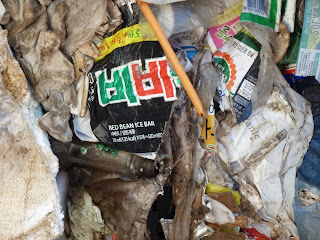Toxics Watch Group Cautions the Public vs Disposal of CRTs on Sidewalks and Dumps (Group Raises Alarm over Improper Disposal of Toxic TV and Computer CRTs)
The indiscriminate dumping of
the glass video component of old television or computer monitor on the street
poses hazards to public health and the environment and should be avoided.
The EcoWaste Coalition, an environmental health organization, aired this
warning after finding discarded cathode ray tubes (CRTs) abandoned on the
sidewalks or street dumps, particularly in Makati and Manila Cities.
"The CRTs of old-style TVs and computer monitors are laden with huge
amounts of lead and other hazardous chemicals. If handled and disposed of
without care, the glass panel, which is lined with lead, will break and
contaminate the surroundings," said Primo Morillo, E-Waste Campaigner,
EcoWaste Coalition.
Aside from lead, CRTs contain a host of other chemicals of concern, including
antimony, arsenic, barium, beryllium, cadmium, mercury, nickel phosphor, and
rare earth metals, which can be discharged into the environment if the CRTs are
recklessly left out on the street or dumped elsewhere.
Lead, in particular, is a cumulative toxicant that can damage the nervous,
blood, cardiovascular, gastrointestinal, renal and reproductive systems in
humans, and is considered one of the “ten chemicals of major public health
concern” by the World Health Organization.
"Careless handling and disposal will cause the lead and other toxic
components of a CRT to be released out of the tube, polluting the air, water
and soil. This is why we cannot simply throw CRTs on the side of the
road. Like any other electronic waste, or e-waste, CRTs must be managed in an
environmentally sound manner," he said.
Morillo also added that even the plastic casings of old TVs contain highly
toxic chemicals. He explained, “CRTs form part of the country’s growing e-waste
containing extremely toxic substances such as the polybrominated diphenyl
ethers (PBDEs) on CRTs’ plastic casings. PBDEs, which are used as flame retardants in
electric and electronic equipment, are among the newly listed chemicals
targeted for global elimination under the Stockholm Convention on Persistent
Organic Pollutants (POPs) of which the Philippines is a state party.”
"To prevent their hazardous contents from polluting the air that we
breathe, the water we drink and the food we eat, we need to keep CRTs and other
e-waste safely handled, stored, recycled, or disposed of,” Morillo emphasized.
“Breaking, dismantling and recycling CRTs in uncontrolled conditions, and
causing their disposal on the streets, creeks, dumps and landfills are
dangerous for waste workers and communities, and is, in fact, illegal,” he
added.
Morillo also noted that the government through the Department of Environment
and Natural Resources is undertaking a project that will ensure the safe
disposal through encapsulation of some 225 tons of leaded glass panels from
about 50,000 CRT monitors.
Supported by the Global Environment Facility and the United Nations Industrial
Development Organization, the said project seeks the safe management of some
1.15 tons of PBDEs in CRTs, as well as 600 tons of polychlorinated biphenyl
(PCB) oil and PCB-contaminated electric transformers.
“To curb pollution and protect human health, we need to improve public
awareness of the negative impacts of the unsafe disposal of e-waste and support
policies and programs towards the environmentally sound management of this
growing waste stream,” Morillo concluded.
-end-
http://www.who.int/ipcs/assessment/public_health/chemicals_phc/en/







Comments
Hazardous waste disposal, transformer disposal, and others.
Waste Oil Collection